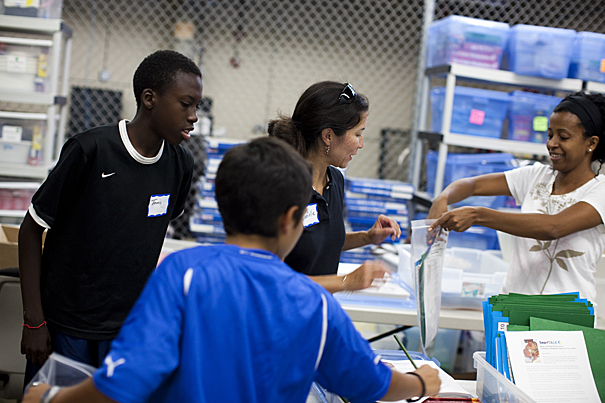
The Harvard Achievement Support Initiative builds on its efforts to engage families by providing homework support kits that will be distributed at the Boston Public Schools’ Back-to-School Night sessions beginning in mid-September. Approximately 30 volunteers put together 3,000 kits for students in grades K-5. Helping to accomplish this were Tonnis James (from left), Gabriel Betancourt, Danielle Betancourt, and Maria Monteiro-Roby.
Stephanie Mitchell/Harvard Staff Photographer
Extra help
Harvard program helps Boston students with homework
Just in time for the school year, Harvard University is putting new tools into the hands of teachers, families, and children.
Approximately 3,000 bags of homework support materials for grades K-5 — including crayons, counters, and magnetic alphabet letters for kindergarteners; play money and rulers for first- to third-graders; and dictionaries, multiplication tables, and calculators for fourth- and fifth-graders — will be distributed to family members attending Boston Public Schools’ Back-to-School Night sessions beginning in mid-September.
The bags, each containing about $15 in learning materials and bilingual homework support tips, are being sent to principals and teachers at Step UP schools that implement Harvard’s SmartTALK: Homework Support for Kids Program. The program was developed by the Harvard Achievement Support Initiative (HASI), the University’s development and grant-making effort to increase learning opportunities for Boston’s young people.
HASI coordinated with principals of the schools and recruited nearly 30 volunteers — including teachers, parents, children, and family outreach coordinators — to put together learning bags at HASI’s offices in Allston. Teachers will offer them to parents along with tips on setting up homework spaces for children.
“I’m thrilled. This helps teachers and parents kick off the year building a great partnership,” said Danielle Betancourt, a first-grade teacher at the John Winthrop Elementary School in Dorchester. “Having the materials is as important as working with parents to use them effectively; it gives parents an entry point in helping to support their child’s learning. Given that the materials are already prepared, I can spend more time helping parents to use them.”
Joan Matsalia and Lisa Moellman, HASI assistant directors, said the effort builds on HASI’s family engagement, which launched last fall with a series of Family Night events, and is designed to help link families to tools and games that support learning at home.
“This is hugely important for students and their families,” said Carmen Rodriguez, family outreach coordinator for the William E. Russell Elementary School in Dorchester. “They will learn skills and habits now that will carry them through the year.”
“It’s exciting to see this kind of collaboration between higher education and primary education, particularly when home-school partnerships are being thoughtfully nurtured by a dynamic group like HASI,” added Betancourt.




